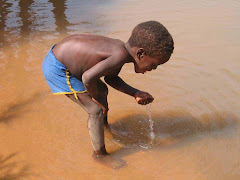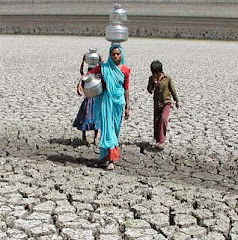Several of the world's largest corporations, some with operations spanning several countries, have been urged to disclose their complete water usage and participate in the first voluntary water-disclosure exercise being undertaken at a global scale by London-based investor-backed non-profit organization Carbon Disclosure Project (CDP).
The CDP issued the first of its kind water-disclosure questionnaire last week in London and began a campaign that seeks to put water consumption on par with carbon emissions as a concern of company shareholders. The organization had scheduled for release of the questionnaire around this time when it launched the initiaitve around November last year.
The exercise is purely voluntary and those who have been approached may not respond. But, they are being encouraged by a pool of investors that brings with it formidable wealth, to do so. The investors represent some $16000 billion worth of assets between themselves.
The initiative comes against a backdrop of declining global water availability creating an immense challenge for companies, and a demand for increasing accountability on usage of the fast depleting resource. In fact, several reports have highlighted that poor water availability as well as an increase in its procurement cost is emerging a formidable business risk.
Several projections point out that in several areas across the world, water may not just be available to run business operations in the not so distant future. At the same time, experts have been issuing stern warnings that companies, and their investors, should start to appreciate the new category of risk to their future businesses -- running out of water.
Projects like CDP's not only manage to create awareness and help businesses and institutional investors understand the risks and opportunities associated with water scarcity and other water-related issues, but at the same time, give a unstated warning to most companies operating in water-intensive sectors.
The 302 companies asked to send in their responses by July-end include the who's who of the global business world -- ABB, Nokia, Intel, Procter & Gamble, Bayer, Boeing, Cadbury, Carrefour, Christian Dior, Danone, IBM, Johnson & Johnson, Coca-Cola, Nestle, Unilever, PepsiCo, McDonald's, Nike, Novartis, Sony Corporation, Yum Brands, among others.
Ford, PepsiCo, Molson Coors, L’Oréal and Reed Elsevier, some of whom are involved in the project in various capacities, are among those who have already accepted to respond.
Indian companies that have been sent the questionnaire are Bharat Heavy Electricals LTD (BHEL), Indian Oil, ITC, Larsen & Toubro, NTPC, ONGC, Reliance Industries, Steel Authority of India Ltd (SAIL). There is also Arcelor Mittal, the global steel giant of India-born LN Mittal.
The questionnaire asks the respondents to spell out if they have a water policy, strategy or management plan. And, if they have one, then it asks comanies to describe it.
It also asks respondents to identify the percentage of their operations in the world’s water-stressed areas and what portion of their water use comes from these regions. It asks companies to spell out their water use, recycling and discharges into or near wildlife habitats as well as list water-related risks and opportunities.
Basically, companies are being asked for details of their water footprint and also make a disclosure that they are maintaining stewardship on this count.
Companies that choose to respond to the questions have the option of making their answers available only to these investors, or to the larger public as well. Also, companies that have not been sent the questionnaire can also respond to it, if they want.
As human population growth and climate change exacerbate water shortages worldwide, such efforts will go a long way to ensure that water management remains tight, and companies and people remain accountable for their water usage.
Showing posts with label water usage. Show all posts
Showing posts with label water usage. Show all posts
Friday, April 23, 2010
Saturday, October 24, 2009
Merck shows the way, brings down water usage
As water supplies across the world dwindle in the wake of climate change and population growth, some companies with a global presence are undertaking serious reduction in water usage. Most of these companies have been making these efforts as part of the overall plan to become more sustainable and minimize business impact on the environment.
Global pharma major Merck announced earlier this month that it has achieved and exceeded its corporate goal to pare water use by 15 per cent between 2004 and 2008. It thus joins a growing list of corporates, including Wal-Mart, Kraft Foods and Whole Foods Market, that are cutting down on water usage in their production systems.
Merck said its strategy for improving water use efficiency included reducing overall demand for water, controlling water discharges and understanding the water-related challenges in regions where it operates.
Merck has achieved significant savings in water use. During 2008, its facilities recycled or reused 1.8 billion gallons of water, reducing its water use by 15 per cent during the previous five years from 2004.
In 2008, the company used 6.1 billion gallons of water less than in 2004, which translated into a 52 per cent reduction. The closure and sale of two water intensive facilities accounted for 59 per cent of its total reduction. Water use reductions at the remainder of its facilities, including new sites that have been added, were 21.4 per cent.
According to the company, it is engaged in numerous initiatives worldwide to reduce water use. Although it has achieved the water use reduction goal, the company said it continues to place high priority on optimizing use of water.
Merck has assigned a water manager at each of its major site who is responsible for identifying water use reduction opportunities, preparing a facility water "balance" to help prioritize the implementation of best practices and conducting water audits to identify leaks and opportunities to reduce water use.
During this year, the company said it will continue its efforts to map water use at its facilities and begin to create profiles of water availability and risks at facilities around the world. The company intends to use that information to identify water use improvements and opportunities that optimize environmental benefit and business value.
It is time that other leading companies too emulate Merck and make efforts to bring down the usage of water, and energy through adoption of efficient methods of production. The need of the hour is to reduce the water footprint and be more water-efficient.
Global pharma major Merck announced earlier this month that it has achieved and exceeded its corporate goal to pare water use by 15 per cent between 2004 and 2008. It thus joins a growing list of corporates, including Wal-Mart, Kraft Foods and Whole Foods Market, that are cutting down on water usage in their production systems.
Merck said its strategy for improving water use efficiency included reducing overall demand for water, controlling water discharges and understanding the water-related challenges in regions where it operates.
Merck has achieved significant savings in water use. During 2008, its facilities recycled or reused 1.8 billion gallons of water, reducing its water use by 15 per cent during the previous five years from 2004.
In 2008, the company used 6.1 billion gallons of water less than in 2004, which translated into a 52 per cent reduction. The closure and sale of two water intensive facilities accounted for 59 per cent of its total reduction. Water use reductions at the remainder of its facilities, including new sites that have been added, were 21.4 per cent.
According to the company, it is engaged in numerous initiatives worldwide to reduce water use. Although it has achieved the water use reduction goal, the company said it continues to place high priority on optimizing use of water.
Merck has assigned a water manager at each of its major site who is responsible for identifying water use reduction opportunities, preparing a facility water "balance" to help prioritize the implementation of best practices and conducting water audits to identify leaks and opportunities to reduce water use.
During this year, the company said it will continue its efforts to map water use at its facilities and begin to create profiles of water availability and risks at facilities around the world. The company intends to use that information to identify water use improvements and opportunities that optimize environmental benefit and business value.
It is time that other leading companies too emulate Merck and make efforts to bring down the usage of water, and energy through adoption of efficient methods of production. The need of the hour is to reduce the water footprint and be more water-efficient.
Labels:
water efficiency,
water footprint,
water manager,
water usage
Subscribe to:
Posts (Atom)

.jpg)


